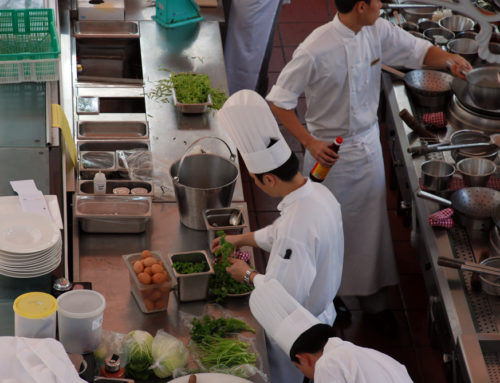All restaurant owners ask themselves the same question with each new hire – can I get these people to run my business the way I want them to?
We hope to instill in them the values that we hold so dearly, values which we hope they will carry with them even when we’re not around.
And no owner sets out to create inefficient training programs that are a waste of everybody’s time.
So why does this happen so often? When it comes to showing people how to do anything, there are a million wrong ways to every right.
In the same way that a great athlete or artist may not make the greatest teacher, a restaurant owner who knows his or her way around the business may not yet have the practice or skills necessary to train a successful team properly.
Here’s an important piece of insight to keep in mind: We’re not doing it wrong so long as we’re focussing on our employees rather than on ourselves, our expectations, and our business.
Many employers make the mistake of turning their training sessions into lengthy orientations that put new hires to sleep. A three-hour presentation, for example, on what we expect from our employees – everything from showing up on time to being in proper uniform. Or they spend half a day going over a list of values like commitment, loyalty, and taking initiative.
We hired them, did we not? Did we go to all that trouble hiring people whom we don’t believe embody those traits or behaviors we value so dearly?
Considering that, let’s assume our employees already possess those values and understand those measures. That way, we can utilize our time more efficiently and focus on empowering them with the knowledge and skills to perform their jobs well.
We want to shift our perspective so that our training sessions are only about them and their abilities to do a great job – for their own benefit. With that perspective in mind, there are four pillars of training necessary for building the foundations of a strong team. Everything else is just fluff and we shouldn’t waste too much time discussing any of it.
Introducing the Menu
We want our team excited about the food and drinks we offer. After all, how can our servers connect with guests and give great recommendations if they’re not sold on the menu, themselves?
Thus, we’re going to show these future representatives of our business how amazing our product is by sharing our entire menu with them, first.
That’s right, the entire menu – from breakfast to dessert, and then we’ll all share some cocktails, after. It’s not a waste of money or a free lunch – it’s the most effective way to get our new employees on board; by showing them what we offer rather than simply telling them.
The key is to discuss the ingredients in every dish and what the flavor profile of each is like. That way, when our servers go off into their sections, they carry with them the ammunition to discuss any item on the menu and can tell their guests, firsthand, just how great every dish or cocktail is.
Role-playing
Restaurants could take notes from sales companies who throw scripts in front of their employees and go over it with them countless times before venturing out into the real world.
That is not to say that a great guest interaction could be trapped within the words on a page, but it is important for servers to know what to say and how to say it. There are so many imaginable scenarios to go over such as when a guest asks if a certain entrée is spicy or for more dire situations like when the guest had wanted tofu instead of chicken.
Role-playing these situations over and over with our employees should cover a huge portion of our training sessions. It gives us a chance to demonstrate how to properly handle various situations they’ll encounter and it builds confidence as well by preparing them for the real thing.
Taking the Training Wheels Off – Patiently!
Of course, training doesn’t stop as soon as our employees are handed a table section. We should be there for our new servers every step of the way as they begin their first week talking to tables, ringing in orders, and running food.
We don’t want to smother them or tell them how to do their jobs, but we do want to be there making sure it’s done right and that we’re answering all their questions.
What we don’t want to do is come down on them for making mistakes or forgetting things. Too often do managers get impatient or upset when new hires are anything less than perfect.
Developing a great server takes time. They WILL make mistakes just like we did when we started – and still do, sometimes! We must be tolerant, understanding, and okay with having to repeat ourselves.
One-on-One Conversations
Employees need to be smooth with the guests, knowledgeable about the menu, and calm in a potentially high-stress environment while also constantly juggling five things at once. On top of that, we work with alcohol and are dealing with a room full of hungry people who expect nothing less than a great experience.
There are a lot of factors at play and so much for each new hire to digest. Consequently, one-on-one conversations are a necessity in the hospitality industry and very much still part of an employee’s training.
Through these conversations, we can listen to what’s working with our employees and what’s not. This gives us opportunities to praise them for what they’re doing right and then help them develop strategies for fixing what needs improvement.
In our industry, we’re constantly hiring new servers and that’s never going to change. The only way to guarantee a strong team that we can rely upon is to develop them the right way from the start.









Leave A Comment